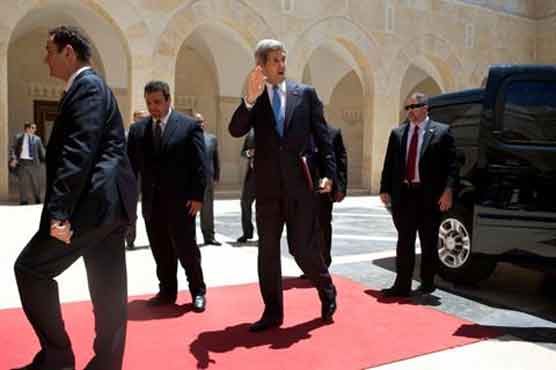Kerry conducts shuttle Mideast diplomacy

An Israeli official says Kerry's visit could yield talks between Israeli and Palestinian delegates.
JERUSALEM (AP) - U.S. Secretary of State John Kerry kept up his frenetic Mideast diplomacy Saturday, shuttling again between Palestinian and Israeli leaders in hopes of restarting peace talks.
Kerry met for two hours with Palestinian President Mahmoud Abbas in Amman, Jordan in what was their second set of discussions in two days. He planned more talks in the evening with Israeli Prime Minister Benjamin Netanyahu in Jerusalem after the two held two meetings over the past two days.
U.S., Israeli and Palestinian officials have declined to disclose details of the talks. "Working hard," is all Kerry would say when a reporter asked him before the latest Abbas meeting whether he was making progress. Kerry, who is on a two-week swing through the Mideast and Asia, has conducted the meetings at a breakneck pace. He even cancelled a stop in Abu Dhabi because of extended discussions on the Mideast peace process.
He had a four-hour dinner meeting with Netanyahu Thursday night in Jerusalem followed by a more than two-hour lunch with Abbas on Friday in Amman at the home of the Palestinian ambassador to Jordan. Then it was back to Jerusalem for another meeting with Netanyahu and dinner with Israeli President Shimon Peres.
On Saturday morning, he boarded a helicopter to fly back to Amman to meet again with Abbas, this time at the Palestinian president's residence there. Later Saturday, he was to return to Jerusalem to meet with Netanyahu, Tzipi Livni, Israel's chief negotiator with the Palestinians, and Isaac Molho, a Netanyahu envoy.
Kerry is scheduled to leave Jerusalem on Sunday to head to Brunei for a Southeast Asia security conference. There is deep skepticism that Kerry can get the two sides to agree on a two-state solution, something that has eluded presidents and diplomats for years. But the flurry of meetings has heightened expectations that the two sides can be convinced to at least restart talks, which broke down in 2008.
So far, there have been no public signs that the two sides are narrowing their differences. In the past, Abbas has said he won't negotiate unless Israel stops building settlements on war-won lands or accepts its 1967 lines before the capture of the West Bank, Gaza Strip and east Jerusalem in a Mideast war that year as a starting point for border talks.
The Palestinians claim all three areas for their future state.Netanyahu has rejected the Palestinian demands, saying there should be no pre-conditions for talks. An Israeli official involved in the talks said Kerry's visit could yield an announcement that Israeli and Palestinian
delegates would meet under U.S. and Jordanian auspices.
"There is such a possibility, but it is not certain," the official told Reuters. A U.S. official declined to comment. Direct Israeli-Palestinian negotiations broke down in late 2010 in a dispute over Israel's settlements in the occupied West Bank and East Jerusalem, territories that Palestinians want
within a future independent state.
Palestinian negotiator Saeb Erekat greeted Kerry on Saturday at Abbas's residence in Amman before the president joined them. Abbas and Kerry had met in Amman less than 24 hours earlier. Erekat asked how Kerry's sessions with Netanyahu and President Shimon Peres on Friday went. Kerry responded: "It was good, it was interesting." State Department officials said Abbas and Kerry met privately for about two hours before advisers joined them.
"U.S. efforts are continuing (but) until now no results that can lead to the resumption of negotiations," a Palestinian source, with knowledge of the talks, told Reuters.


